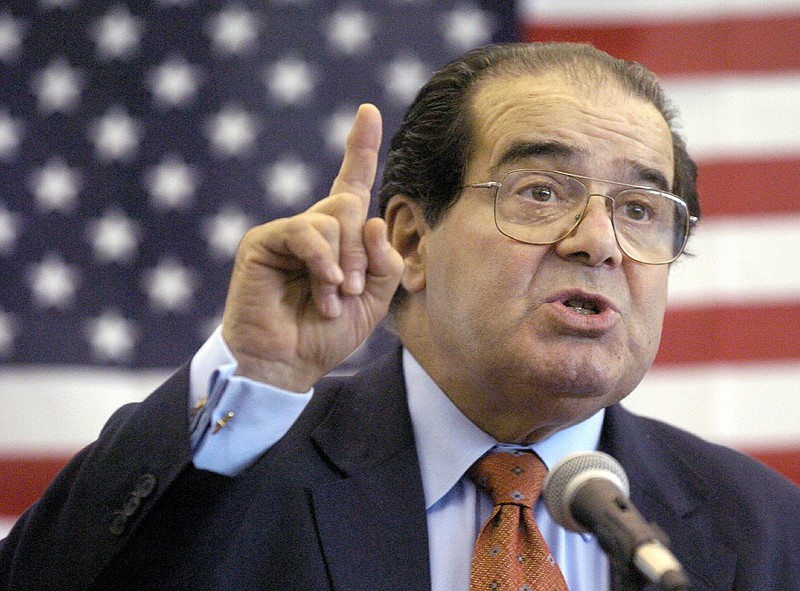Anyone who thought President Barack Obama wouldn't take the opportunity to nominate a Supreme Court justice who would affect the balance of power in the high court was only whistling in the wind or hasn't been paying attention for more than seven years.
The president, as is his right according to the Constitution, will nominate someone to replace the late Justice Antonin Scalia on the Supreme Court, in his words, "in due time."
It's what the Republican-controlled Senate does in response - since it has the constitutional authority to advise and consent on such nominees - that will be consequential.
We feel, given the circumstances, the GOP has little choice but to oppose a nomination for the rest of Obama's term unless he nominates a centrist jurist who could garner support from both sides of the aisle. Given the president's hyper-partisanship, that type of nomination is unlikely.
If the Senate does not move through a nominee for the rest of Obama's term, a potential Republican president would nominate someone more appealing in 2017. If the Senate does not move along the nominee, it would have to consider the same nominee - or an equally unpalatable substitute - if a Democrat is elected president in November. Or, if a Democrat Senate is elected this fall - a long shot at this point but more likely if a Democratic president is elected - Republicans won't have a say-so at all.
If Republicans do choose the take-no-action route, they could claim they're only taking the advice of the man who is expected to be the Democratic minority leader or majority leader, depending on the makeup of the Senate, in the next Congress.
In July 2007, 19 months before the end of the second term of President George W. Bush, Sen. Chuck Schumer, D-N.Y. said any high court nominees the president sends up should be rejected.
"We should not confirm any Bush nominee to the Supreme Court, except in extraordinary circumstances," he said in remarks to the American Constitution Society, a liberal legal organization. "[Nominees] must prove by actions, not words, that they are in the mainstream rather than we have to prove that they are not."
Not surprisingly, Schumer was singing a different tune over the weekend, calling Senate Majority Leader Mitch McConnell's suggestion that an Obama nominee not get a vote "obstructionist."
"When you go right off the bat and say, 'I don't care who he nominates, I am going to oppose him,'" he said on ABC's "This Week", "that's not going to fly."
Some Republicans recall correctly that Democrats started the deeply ideological high-court battles when they rejected - and slandered, frankly - Robert Bork as a Supreme Court nominee by President Ronald Reagan in 1987. Others remember President George W. Bush's myriad first-term lower-court nominees held up by Senate Majority Leader Harry Reid, D-Nev., and Senate Judiciary Committee Chairman Patrick Leahy, D.-Vt.
Still others say any Senate delay will be a consequence of the Democratic leadership's decision in 2013 to change the rules for presidential appellate judge appointments and recess appointments to be approved by a simple majority instead of 60 votes.
"Elections have consequences," Sen. Lindsey Graham, R-S.C., said, "and abuses of power have consequences."
It's a shame the death of such a brilliant jurist - Obama crony Cass Sunstein called Scalia "one of the most important justices in the nation's history" and "among the greatest" - will have such far-reaching political ramifications. To Scalia, after all, "originalism" or "constitutionalism" trumped politics in high-court decisions.
But, for at least the next nine months, politics and the Supreme Court will be inexorably joined. Republicans, who have seen voters turn to support an outsider like businessman Donald Trump in light of the party's seeming inability to contest Obama's policies, have to hitch their wagon to putting off a vote. If they do any less, presidential voters may stay home as they did in 2012 (which gave Obama a second term).
Democratic contenders also have to keep the pressure on for a vote on Obama's nominee, hoping it makes the electorate overlook their sizable negatives.
The Supreme Court battle also could spill over to Congress if Democrats, angry about the lack of a vote on the president's nominee, refuse to compromise on legislative matters, effectively grinding Washington, D.C., to a halt. The scenario would be similar to Congress from 2011 to 2015, when the GOP controlled the House and Democrats the Senate. But Reid, the Senate majority leader, kept legislation from moving so as to not embarrass Obama by anything slipping through that he didn't want.
Scalia will have as his legacy not only the decisions he authored but also the lawyers and judges who - again, as at the founding of the country - look to the Constitution rather than putting a finger to the wind to see which way it is blowing. However, the pitched political battle for his seat on the Supreme Court - no matter what side you're own - is not a fitting eulogy.
